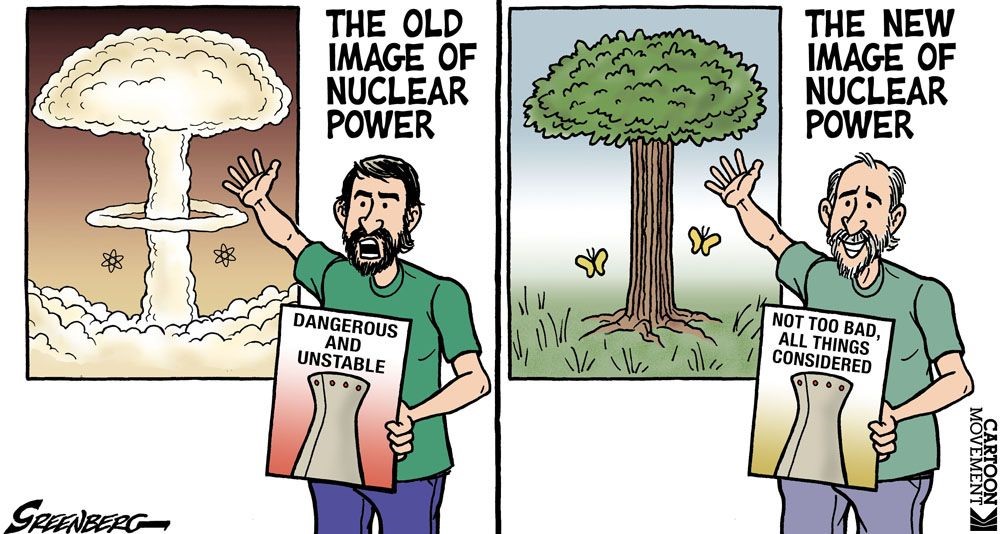Let’s stop focusing on beliefs and really start communicating
How many discussions have you had today where either you or the other person thought carefully, and then said “here is what I believe….”? Believe is a strong word. It evokes personal values; and when something makes it to the level of a belief, it is often unshakeable.
There was a time when we didn’t talk like this. We gave our opinion, or our view on a topic. This was developed through learning, by listening to (hopefully) an expert or reading relevant information. An opinion meant this is what we think at the moment, and that should we learn more, we may change or evolve our position. Now our views on almost every topic need to be elevated to the level of “belief”. And as we know, we don’t change our beliefs easily.
In our world of nuclear power, we know that many have strong views on whether this technology is worthy of being a path to a better world with clean economic abundant energy, or as others believe, is a path to our eventual demise. We have written before about the need to ramp up our communications and work hard to increase support for nuclear power. The facts are on our side, but negative beliefs stand in our way. We are happy to see even more young people come out with supportive communications, from Jarret Adams, to Eric Meyer at Generation Atomic and Bret Kugelmass with his podcast series, Titans of Nuclear; each using their own unique method to promote a nuclear future.
As it is the middle of summer, this is when we love to be a bit more philosophical. It is a time to do some deep thinking while enjoying the sunshine and sharing some more esoteric views based on our reading list so far this year. I have read a few books that I think are useful to both better understand the current environment for communications and provide some useful insights on how to better communicate going forward.
You may think these three books have nothing in common, but I see a common thread that should contribute to our thinking as we move forward. They are “The Death of Expertise: The Campaign Against Established Knowledge and Why it Matters” by Tom Nichols, “Is Gwyneth Paltrow wrong about everything: When Celebrity Culture and Science Clash” by Timothy Caulfield and finally, “If I understood you, would I have this look on my face?: My Adventures in the Art and Science of Relating and Communicating” by Alan Alda.
The first two books provide us with two different but complementary views of the environment we live in. Tom Nichols, in his excellent book, makes the case that America has taken freedom and liberty to an unrealistic extreme – that there is a common belief that everyone is equal and thus, so are their opinions. In fact, he goes so far as to suggest that it is cool to be ignorant. Experts are no longer respected and in fact, he states that “we actively resent them, with many people assuming that experts are wrong simply by virtue of being an expert.”
He talks about the changes to higher education, where young people think they are customers buying a service rather than students given an opportunity to learn. He talks about the changing news media, from provider of unbiased news to “infotainment” and notes that too many people approach the news not to seek information but rather confirmation of what they already know, avoiding sources they disagree with because they believe they are mistaken or even lying (“fake news”).
This book is a must read, with more good quotes than I can use in a short blog post. But if I can summarize in one quote, it would be as follows. “The death of expertise, however, is a different problem than the historical fact of low levels of information among laypeople. The issue is not indifference to established knowledge; it’s the emergence of a positive hostility to such knowledge. This is the new American culture, and it represents the aggressive replacement of expert views or established knowledge with the insistence that every opinion on any matter is as good as every other. “ For everyone in the nuclear industry – sound familiar?
If we don’t listen to experts, then who do we listen to? That is answered in the next book. In his fascinating book on celebrity culture and how it influences us, Timothy Caulfield explores the massive power that celebrities have over our decisions and beliefs. This ranges from using beauty products endorsed by your favourite celebrity (costly but not likely harmful), to using their favourite health care products (costly and may be harmful), to taking bad decisions that can negatively impact the health of our children like avoiding vaccines (definitely harmful).
In summary, we have replaced “experts” who we no longer believe in, with celebrities, who are the ones we look up to. We long for fame rather than accomplishment and dream of achieving it without necessarily working to get there. Anything to be like our idols. Unfortunately, the outcome is often nothing more than an empty wallet and little in terms of being able to take decisions that positively impact our lives.
This takes me to the third book of the bunch, Alan Alda’s book on how to better communicate science. Of course, if we shouldn’t listen to celebrities, then why listen to Alan Alda? It tuns out that he has been involved in communicating science to laypeople for over 20 years, having hosted a show by Scientific American and then starting the Alan Alda Center for communicating science at Stony Brook University. So, what does this book have to say that you may not have heard before? It makes a strong case for communicating, which means having a conversation noting that “real conversation can’t happen if listening is just my waiting for you to finish talking.” It talks about the importance of having empathy for your audience, consistent with many who talk about better communications; but he goes further, saying empathy is not enough; we need to be able to “relate” to our audience. Only then are you really communicating. The book then makes the case for using theatrical improvisation techniques as a means to break down barriers to learn to relate to others.
What can we learn from these books that we can apply to the nuclear industry? Our objective is to change the paradigm on nuclear power and raise awareness of the many benefits it brings to society. To do that let’s first work to improve our approach to communicating. We need to avoid trying to change others’ deeply held beliefs nor try to impose our own beliefs on others. This is a path to nowhere.
Rather, we need to focus on communicating, i.e. having an open and productive conversation with others while working hard to keep open minds. It is a willingness to consider new information that is important for life long learning. Go beyond empathy and truly try to relate. Developing a relationship is hard work but hopefully the outcome will be that we both understand each other better and learn something new.
Moving the needle on public opinion on nuclear power is important and also very challenging. Hopefully some of these perspectives will help us think of new and better ways to have the conversation.
Afterword
For those of you that are interested, the following are a few more quotes from The Death of Expertise. Powerful stuff.
“There is a cult of ignorance in the United States, and there always has been. The strain of anti-intellectualism has been a constant thread winding its way throughout political and cultural life, nurtured by the false notion that democracy means that “my ignorance is just as good as your knowledge.””
“These are dangerous times. Never have so many people had so much access to so much knowledge and yet have been so resistant to learning anything. In the United States and other developed nations, otherwise intelligent people denigrate intellectual achievement and reject the advice of experts. Not only do increasing numbers of laypeople lack basic knowledge, they reject fundamental rules of evidence and refuse to learn how to make a logical argument. In doing so, they risk throwing away centuries of accumulated knowledge and undermining the practices and habits that allow us to develop new knowledge.”
“Rather, Americans now think of democracy as a state of actual equality, in which every opinion is as good as any other on almost any subject under the sun. Feelings are more important than facts: if people think vaccines are harmful, or if they believe that half of the US budget is going to foreign aid, then it is “undemocratic” and “elitist” to contradict them.”






6 Comments
Aman Usmani · August 23, 2018 at 9:12 am
Milt,
This blog is very insightful, well researched and summarized for the benefit of the readers. It explains well the current environment of not just fear of nuclear power but also the uncertain socio-political situation.
Well done keep up the good work.
Steve Kidd · August 24, 2018 at 2:39 am
I find myself disagreeing with (or at least questioning) a lot of this. Sorry!
The distinction between beliefs and opinions is a fine one, but I suspect that people today have fewer firmly held beliefs than in the past. Consider, for example, the decline of religious beliefs (certainly in the UK). People have access to much more information than before and, in general, are better educated. I’m not sure that they’re as gullible and unable to weigh up information that is put before them as these authors claim.
Is there really a death of expertise? I’m just recuperating from major back surgery which involved a long stay in hospital. I’m not a spineless individual any more! During this time, I was in the capable hands of many experts. I accepted 100% what they said and continue to do so with the physios who now guide my slow recovery. Richard Branson, Sting and Bono may have strong beliefs (or are they just convenient self-serving opinions?) but do people really blindly follow these? I don’t think so. Their voices may be useful additions to a cause but I don’t think we’ve yet reached the point of being blind sheep-like followers.
Yet there’s nothing wrong with a healthy scepticism about “experts”. Many (I include economists like me) fully deserve the flak that goes their way. There is plenty of “fake science” out there, but I remain convinced that the best stuff will always eventually win through and that many experts in various fields will still win the support of society. Like my long-suffering doctors.
“We’ve got to change our approach to communicating….”. Oh no…..for goodness sake…..I’ve been hearing this at nuclear conferences for 20 years! It’s as much crap today as it always was! With this nonsense, you’re basically giving up on making the crucial paradigm shift (away from the belief that nuclear power is dangerous). You may find a few people who will begin to agree with you, but the nuclear industry has zero long term future unless it sets out to overcome one belief deeply held by most people, in other words that low levels of radiation are dangerous. In other words, the fear paradigm.
This is a task that will take maybe 20-30 years. It took similar periods to effect paradigm shifts such as the belief that capital and corporal punishment are right and effective, or that homosexuality is wrong and should be punished. Yet the stupid nuclear industry isn’t even starting down the necessary road. It’s led by second-rate, self-interested people who are locked into the fear/danger paradigm. Their words and actions invariably support this. Why is there no opposition to the nonsense about the mildly radioactive water at Fukushima? What does the general public think about the nature of nuclear waste when the industry tells it that it must be buried hundreds of metres below the surface?
There are plenty of possible allies out there if the industry is prepared for the real battle. Not the former environmentalists who have come over to the nuclear side – as much use as the turncoats in World War II! Why not start with some of the medics? It’s not just me who believes what they say. They face a battle in nuclear medicine with those opposed to the small doses of radiation from CT scans and the like. Get talking….there’s a battle to be won!
Nathan Lewis · August 26, 2018 at 12:17 am
Why are former environmentalists not a great ally? The only reason I got interested in nuclear power again was because of climate change. The Michael Shellenberger, Mark Jacobsen debate breaks my heart. I don’t think we can win the fight against climate change without both sides pulling on the same side of the rope’.
Steve Kidd · August 26, 2018 at 4:07 pm
It’s impossible to win acceptance of a technology on the basis of what it doesn’t do. Getting involved with environmentalists means is a blind alley for nuclear. It merely boosts the case for renewable power solutions. People are genuinely afraid of nuclear and it will become a last resort which is never selected.
Barry Muller · August 27, 2018 at 5:25 am
I wish I had more time to discuss this with you, especially as my 20-30 year experience working in nuclear and discussing the pros of nuclear power with friends family, and strangers has resulted in a perspective that closely aligns itself with the point the original poster was trying to make.
Any rate, your comment: “Yet the stupid nuclear industry isn’t even starting down the necessary road. It’s led by second-rate, self-interested people who are locked into the fear/danger paradigm. Their words and actions invariably support this. Why is there no opposition to the nonsense about the mildly radioactive water at Fukushima?”
Why would the nuclear industry’s self interest be locked into the “fear/danger paradigm”, which only leads to illogical conclusions about nuclear power which, in a democracy, is detrimental to the continued use of nuclear technology to generate electricity?
The reason for the lack of opposition to the nonsense about the mildly radioactive water is that most experts do not want to discuss technical issues with highly emotional people who don’t want to listen anyway. These people do not want to discuss/debate the issue, they just want to shout you down online or in person. This also speaks exactly to the points the original poster was making.
In the 1950s and 1960s the industry was very good at trying to educate the public on the benefits of nuclear power – we need to get back to that. In my own way I’m already on board with and trying to do that most every day.
Steve Kidd · August 28, 2018 at 3:19 am
The waste water fiasco at Fukushima is 100% the fault of the nuclear industry. It accepts LNT on radiological protection, so any incremental radiation is potentially harmful. Indeed, large numbers of people in the industry, including some of today’s leaders, have made careers that depend on LNT. If radiation isn’t so important and maybe dangerous, many careers have been a waste of time. So why should the general public accept the Fukushima waste water going directly into the sea? The industry itself says it is dangerous…and is certainly doing very little to solve the crazy situation.
Regarding industry communications in the 50s and 60s, spokespeople were sometimes arrogant and talked down to their audiences. But at least they had confidence and a degree of authority which today is sadly lacking. Today the approach is over-defensive and meekly seeks accommodation with renewable energy solutions. So the industry will slowly get stangled…! The answer is to put a full effort into getting rid of LNT, then embark on an aggressive full PR campaign extolling the industry’s case….and stopping the lies and deceits that are currently thrown at it.
Comments are closed.